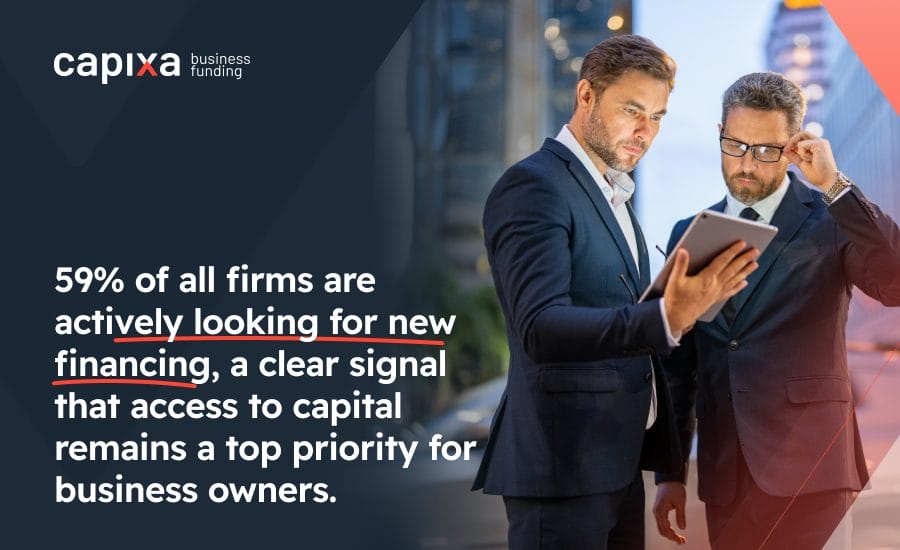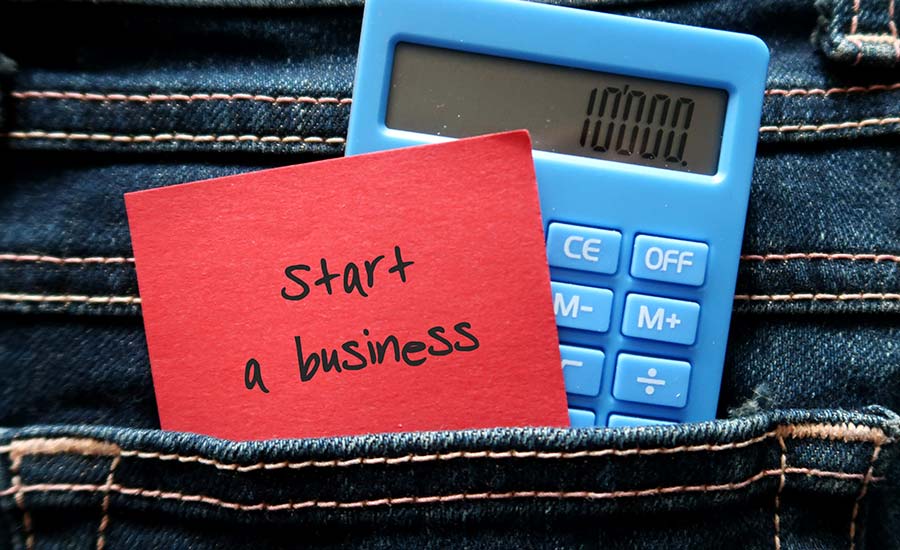Is a Small Business Loan Secured or Unsecured? A Detailed Guide

With small businesses accounting for more than 99.9% of all businesses in the United States, a small business loan offers an opportunity for growth for privately owned businesses across the country.
Whether you’re starting a new venture or looking to grow your existing business, a secured or unsecured small business loan can help.
We’ll break down the basics of secured and unsecured business loans, highlight the pros and cons of each and detail the types of loans we offer at Capixa.
Is a Small Business Loan Secured or Unsecured?
Small business loans can be either secured or unsecured.
The main difference between the two types is that secured business loans require the borrower to pledge assets as collateral — whether it’s property, equipment, or other valuable items.
In contrast, an unsecured loan does not require collateral, which can decrease the borrower’s risk but increase the lender’s risk, which inherently increases the cost of capital.
Factors to consider when choosing a loan type include:
- Business needs
- Asset availability
- Financial risk tolerance
- Credit score
- Loan terms
With the right guidance and thorough evaluation, the right business lending type can serve as a catalyst to propel your business towards its next phase of growth and stability.
What Is a Secured Business Loan?
A secured business loan is a type of financing where borrowers pledge assets, such as property, equipment, or inventory, as collateral to obtain funds. This collateral acts as a safety net for lenders, offering a recoverable asset if the borrower fails to meet repayment obligations.
A secured loan safeguards the lender by offering collateral as a means to potentially recoup losses if repayment is not provided as agreed upon. While the collateral provides assurance, lenders typically prefer not to seize and sell these assets, as they often have to sell at a discounted price to quickly recover losses and maintain liquidity.
While secured loans provide appealing borrowing options due to their generally favorable terms, there are both pros and cons to consider.
Pros of Secured Loans
- Lower interest rates: Generally, secured loans have lower interest rates because the lender has the collateral as a safety net, reducing their risk.
- Higher borrowing limits: Since the lender has collateral to fall back on, they may be more willing to offer larger loan amounts, which are based on the value of the asset.
- Longer repayment periods: Secured loans often come with longer repayment terms, making the payments more manageable.
- Access to equity without selling: Secured loans allow borrowers to access the equity within an asset without having to sell it, making it possible to leverage assets while still retaining ownership.
Cons of Secured Loans
- Risk to assets: The most significant disadvantage is the risk of losing the asset (collateral) if the borrower defaults on the loan.
- Complex approval process: Secured loans might involve a more intricate and lengthy approval process compared to unsecured loans, because the lender may require a thorough appraisal of the collateral.
- Potential for additional costs: There might be additional costs involved, such as appraisal fees, legal fees, and other related charges.
What Is an Unsecured Business Loan?
An unsecured business loan is a financing option that does not require borrowers to provide collateral as a safeguard to the lender. It is not backed by assets, so the borrower’s property and equipment is not at direct risk in case of default.
Unsecured business loans tend to involve an elevated level of risk for lenders due to the lack of collateral. This often translates to higher interest rates and potentially more stringent repayment terms, when compared to their secured counterparts.
While unsecured loans offer easy access to funds, it’s important to weigh both their benefits and drawbacks.
Pros of Unsecured Business Loans
- No collateral required: Businesses or individuals do not have to risk their assets as the loan does not necessitate collateral.
- Fast approval process: Without the need to evaluate collateral, unsecured loans often have a quicker approval process.
- Flexible use: These loans usually come without stringent stipulations regarding their use, providing flexibility in how the funds are utilized.
Cons of Unsecured Business Loans
- Higher interest rates: To compensate for the risk, lenders usually charge higher interest rates for unsecured loans, compared to secured loans.
- Lower borrowing limits: Given the higher risk to lenders, unsecured loans often have lower borrowing limits.
- Variable approval criteria: Depending on the lender, the approval criteria for unsecured loans can vary significantly. Some lenders might offer high-risk products with minimal requirements, while others could have stringent conditions.

How To Decide Between a Secured vs. Unsecured Small Business Loan
Both secured and unsecured small business loans have advantages and challenges.
To choose the right type of loan for your needs:
Assess Your Business Needs and Financial Health
Determining the right type of loan for your business begins with a thorough examination of your financial landscape. The first step is to pinpoint the exact need that the loan will address.
Factors to keep in mind include:
- Creditworthiness: Consider your business’s credit score and financial history, which will play an important role in unsecured loan applications.
- Asset availability: Evaluate the assets you have that could potentially be used as collateral for a secured loan.
- Financial stability: Analyze your cash flow statements, balance sheets, and financial projections to ensure that your business can manage loan repayments efficiently.
Evaluate Your Risk Tolerance
Risk tolerance is a degree of variability in investment returns that an investor or business is willing to withstand in their financial planning.
Risk tolerance factors to consider include:
- Collateral risks: For secured loans, make sure you are comfortable putting assets at risk in the event of payment defaults.
- Financial risks: For unsecured loans, make sure you are prepared to face higher interest rates and potentially stringent repayment terms that could strain your financial operations.
Consider Loan Terms and Repayment Plans
It’s important to evaluate loan terms and repayment plans when making your decision.
Loan terms and repayment plan factors to consider include:
- Loan tenure: Secured loans often come with longer repayment periods due to the inclusion of collateral, while unsecured loans might offer shorter time frames due to the elevated risk to lenders.
- Interest rates: Secured loans may offer lower interest rates as they are less risky for lenders, while unsecured loans might carry higher rates to offset lender risk.
- Repayment structure: Secured loan repayments often offer more flexibility with potentially lower interest rates and longer terms, due to the collateral provided. Unsecured loans typically have higher interest rates and stricter repayment terms, due to the increased risk borne by the lender.

Schedule A Consultation With Capixa for Your Small Business Loan
Capixa is an investment capital funding company that takes a human approach to business lending, by understanding your needs to find the best small business loan solution.
Our compassionate team of business builders, problem solvers, and clever investors help businesses get small business loans quickly, securely, and on their own terms.
If you’re running a small business and you’re seeking support, Capixa offers:
- An extensive lender network: We give you various options and tailored opportunities just for your business.
- Customized terms: We create small business loan terms that are shaped around your business’s unique needs and aspirations.
- A relationship, not just a transaction: Our aim is to form a long-term relationship, not just facilitate a one-time transaction.
- Guidance every step of the way: Expect clear, ongoing communication and expert advice to guide your decisions.
What sets Capixa apart in the competitive financial terrain? Our business is a blend of expert knowledge, an extensive lender network, and a commitment to developing meaningful relationships with both borrowers and lenders.
Schedule a consultation with our team and find out how we can help.
FAQS About Secured vs. Unsecured Business Loans
Is it better to have a secured or unsecured loan?
The “better” option hinges on your business’s specific needs, financial health, and risk tolerance. A secured loan might be the better option if you require a larger amount of money, a longer repayment term, or you have assets to leverage and want to capitalize on lower interest rates.
However, an unsecured loan could be more favorable if you’re seeking quick funding without risking assets and if you’re comfortable with a potentially higher interest rate and shorter repayment period.
What is the biggest difference between a secured and unsecured loan?
The biggest difference lies in collateral. A secured loan requires collateral — physical or financial assets that the lender can seize if you default on the loan.
An unsecured loan does not require collateral, relying instead on creditworthiness, and often comes with a higher interest rate due to the elevated risk to the lender.
Why is a secured loan riskier than an unsecured loan?
While secured loans often carry lower interest rates due to decreased lender risk, they are generally considered riskier for the borrower. This stems from the requisite collateral — if the business fails to meet its repayment obligations, the assets used as collateral (such as property, equipment, or other valuable resources) are at risk of being seized by the lender, potentially jeopardizing the business’s operations.
What credit score do you need for a secured loan?
The credit score needed for a secured loan can vary widely among lenders and depends on multiple factors, including the loan amount and the lender’s risk appetite. Generally, a good business credit score of 670 or above can facilitate favorable terms.
However, since the loan is secured against collateral, some lenders might be willing to negotiate with businesses that have lower credit scores, offering them access to financing, albeit potentially on less favorable terms.
Can you borrow more on a secured loan?
Typically, yes. With secured loans, lenders tend to offer larger loan amounts because the collateral mitigates their risk. The value of the assets used as collateral often directly influences the amount that can be borrowed.

![What Is a Small Business Loan [How it Works + Types of Loans]](https://capixa.com/wp-content/uploads/2024/09/what-is-a-small-business-loan-hero-image.jpg)
